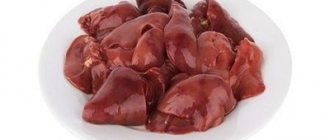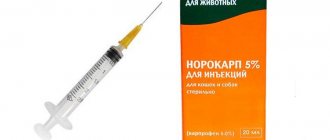Dog owners ask about everything online - how to teach a dog not to indulge, what the owner should not allow, whether dogs can have eggs, boiled seafood, fruits - there are many questions, including about nutrition, and all of them are important. The life expectancy, health and well-being of the pet depend on the answers.
When and how to feed a dog is one of the first questions that arises in your head after purchasing a puppy. If the choice is made on natural food, the proportion of nutrients (how much and what proteins, fats and carbohydrates should be given per day) in the diet must be strictly observed.
A responsible owner, before giving his pet something new to eat, thoroughly finds out what is allowed and what is not allowed in the dog’s body.
Since a dog is by nature a predator, the basis for its diet should be proteins, the lack of which cannot be allowed. Even a vegetarian owner must overcome himself and cook meat if he wishes his four-legged friend health and long life.
But proteins are found not only in meat - any bird eggs are perfect for this purpose.
Of all protein foods, they have the highest nutritional value for dogs. Wolves do not miss the chance to feast on nests that happen to come their way, and they know a lot about survival.
Why does a dog need eggs?
Because it is a very nutritious product - an excellent source of protein that renews muscle tissue and strengthens the coat. The amount of vitamins and beneficial nutrients in them is so great that you can live for many years on eggs alone in the absence of other available food.
But whether a dog can have eggs in each specific case, indigestion or poor health of the dog, must be decided together with a doctor or, at least, using books on veterinary medicine and nutrition.
Which eggs do dogs like best? Yes, everyone you can reach! Like wolves, a dog can eat everything healthy to its fullest and then suffer from stomach pain from overeating.
Chicken
Raw
Raw eggs are a source of a lot of useful substances that are vital for a pet:
- Protein is an element necessary for the construction of muscle tissue and the shine of a dog’s coat.
- Vitamins : A, E, B1, B3, D.
- Minerals : potassium, selenium, phosphorus, iron, calcium.
- Amino acids that are not found in plant foods.
But you should not feed your animal raw eggs too often. The fact is that they contain a substance - avidin, which prevents the absorption of biotin , due to the lack of which there can be a violation of carbohydrate-lipid metabolism and, as a result, nausea, muscle pain, and anemia.
Therefore, the ideal norm: 1-2 pieces per week . In addition, the product must be fresh and of high quality to avoid infection with salmonellosis.
The main rule of feeding: raw eggs must be mixed with other foods (usually low-fat cottage cheese or kefir).
White or yolk?
Dogs are allowed both white and yolk equally. Protein is an easily digestible source of building material for your pet. The yolk , in turn, is rich in omega-3 polyunsaturated fatty acids, necessary for the brain, retina and cell membranes. In addition, the yolk contains choline, an important element for the productive functioning of the liver and brain.
Attention! Some dog owners are afraid to give their animals yolk due to the presence of cholesterol in its composition. However, according to experts, fears are groundless if you do not exceed the permissible limit (1-2 pieces per week).
Boiled
Boiled eggs are just as healthy as raw ones. Is it possible that raw ones are absorbed better and faster by the body ? But before giving a raw egg, you need to make sure that the product has been tested and is not contaminated with salmonella and other parasites.
If this is not possible and the owner purchases them at the supermarket, the best solution would be to hard boil the egg .
Dog breeders do not recommend giving boiled eggs to dogs that have been eating dry food for a long period of time, because.
Possible digestive problems. Important! An unspoken rule among dog breeders: raw meat - raw eggs, boiled meat - boiled eggs.
Why can't you feed fried food?
Fried ones are contraindicated because they contain excess indigestible fats , which impede the functioning of the liver, heart and gastrointestinal tract. Your pet may also develop pancreatitis.
What can you give - white or yolk?
Both this and that. Yes, from the point of view of cholesterol content, the yolk of an egg is a rather serious product, which, if consumed regularly, for example, in the form of scrambled eggs with bacon, can affect the condition of blood vessels, lead to atherosclerosis and liver problems. Therefore, moderation is important in everything, and it’s probably not worth mentioning that any fried food is strictly not recommended for your pet.
But do they have to be boiled eggs, or are raw eggs allowed? Can dogs eat boiled and raw eggs? The answer is yes, you can give your dog both raw and boiled eggs, only raw ones take longer to digest. You just need a measure, you also need to evaluate additional factors - weight, age, the dog’s well-being, overall nutritional balance.
What eggs can dogs eat?
The most affordable are chicken eggs, but if it is possible to give the dog eggs of other types, then you need to use this opportunity. But it should be remembered that duck, goose, turkey, and ostrich are larger in size and the yolks contain more nutrients and cholesterol. Therefore, you need to regulate the number of eggs given to the animal during the week, focusing on chicken eggs. One tablespoon of yolk is equal to one yolk of a large chicken egg.
Quail eggs are very small, so their number, on the contrary, is increased. Ostrich eggs are so huge that the contents of one egg are equal to about 20 chicken eggs.
What is the balance of dog bju?
When wondering whether it is possible to give raw eggs to dogs, the first thing you need to do is solve the situation of balancing BJU (proteins, fats, carbohydrates) in the diet.
To do this, you need to take into account the exact weight, age and gender of the dog, the breed's susceptibility to allergies, as well as its condition - pregnant and lactating bitches need increased nutrition. Specialized veterinary forums will help the owner with this, telling about the correct approach to the problem of natural nutrition.
If dry food is immediately labeled as required - “For puppies”, “For older dogs”, “For pregnant and lactating bitches”, then the composition of natural food is developed on an individual basis. For example, when asking if dogs can be given raw meat products, the owner is almost sure that it is possible. But no - everything, and only after freezing or heat treatment. Raw meat can contain parasites, and pork will very quickly damage your pet’s liver and pancreas.
Carbohydrates (porridge) and vegetables or fruits must also be approved by veterinary nutritionists. For example, dogs are strictly prohibited from eating grapes. A reasonable owner will play it safe and will not ruin the health of his four-legged friend.
When to give eggs and when not to give?
Owners of dogs who have liver problems and general obesity are afraid to give their dog eggs - and quite rightly, the liver does not tolerate excess cholesterol, so only diet and low fat content in food will save the dog in this case.
In addition, before giving your dog an egg, you should be sure that your four-legged ward’s pancreas is normal. However, if the doctor says that eggs can definitely be given to a dog, do not rush to feed them after suffering from pancreatitis or liver diseases. The diet should continue to be followed, and eggs should be given less often - let the dog rely on low-fat meat and cereals. Ideally, after problems with the liver and pancreas, veterinarians recommend switching the animal to specialized food.
Healthy replacement for eggs
If a dog has a food allergy to eggs, it is not at all difficult to replenish all its beneficial properties. For example, dairy products, especially cottage cheese, contain huge amounts of calcium. However, treating your dog with it more than twice a week is harmful, since it contains the harmful substance casein, which increases the acidity of the environment in the digestive system. This protein is especially harmful to animals suffering from pancreatitis.
Vegetables are another source of beneficial elements. They are easily digestible, quickly digested, very healthy and rarely a source of allergies - an excellent replacement for eggs. Legumes have a high level of protein, however, they should be given carefully as large amounts will cause intestinal problems. Fresh fruits are a great treat, however, there are exceptions that are dangerous for your pet.
If you give, then how?
How often is it allowed to offer your pet an egg, how many times a week or month? A separate question is whether or not to give raw chicken eggs, which many people are afraid to eat themselves.
So, a dog weighing up to 15 kilograms should not be given more than two eggs (chicken) per week; small ones, accordingly, are given even less.
Pregnant bitches can be given eggs once every three days, and recovery after childbirth may be faster if the mother of newborn puppies is given raw eggs, but again, no more than two days a week.
Quail eggs, which contain the most useful substances, are very useful and less difficult for a dog’s stomach to digest.
due to their size, the product can be given twice as often.
Is it possible to give your dog raw eggs every time he asks, and not just on a schedule? One owner said that at one time he became interested in drinking eggs straight from the shell, and the eight-month-old dog decided to participate in the ritual and insistently demanded to share. By the time he grew up, the dog developed an allergy, the cause of which could not be determined. Through the method of trial and elimination, it turned out that he could no longer eat eggs at all.
In addition, if there is an excess of protein in the diet, the question of whether it is possible to give a dog a raw egg more often than once or twice a week should not arise. An imbalance in the balance of the BJU will definitely work like a time bomb and will affect the dog in old age.
Raw and boiled yolks differ slightly in the content of useful substances, but boiled eggs are digested by both the human body and the dog much more easily.
Whether or not dogs can have raw eggs is up to the owner to decide. The owner must take into account all potentially harmful factors and not cause harm to the animal.
Types of preparation
Raw and cooked eggs are equally healthy, as the amount of protein in them does not differ. Only the speed of absorption by the body differs - boiled food is twice as fast as raw food. If the owner is tormented by a painful choice: how exactly to give an egg to a dog, then everything is simple. If your pet constantly receives boiled food, then you should boil the egg; if it is food or raw meat, then vice versa.
Fried eggs are very harmful for dogs to eat, as the high fat content in this dish can lead to problems with the animal's pancreas. If a breeder really wants to pamper his pet with a delicacy, the best choice would be a light and healthy omelet prepared without oil.
Eggshells are a very useful addition to food, as they contain a lot of calcium, which is beneficial for the musculoskeletal system. But, of course, you cannot give it whole, as the pet may choke or injure the mucous membranes of the mouth or esophagus. It is better to crush or grind the shells, and then add them to the main food no more than once a week.
Puppies and the egg question
At what age can puppies be given egg products, whether thermally processed or raw, should be checked with a doctor, based on the specific breed and age, as well as the current feeding regimen of the animal.
In short, yes, you can.
However, the best food for a puppy for the time being is the bitch’s milk.
Well, whether a puppy can have a boiled egg, his mother, who has run out of milk or has eclampsia, will not tell her, so the person will have to determine the proportion of eggs in milk feeding. The relevant information is available on specialized websites where you can get advice from breeders of a particular breed.
Only after a detailed examination of the baby’s diet is it concluded whether it is possible to give the puppy a boiled egg, and again only experienced breeders can give advice that will definitely not harm or spoil the baby’s digestion.
How to avoid poisoning your dog with eggs?
It is advisable to give eggs from chickens or other birds only if you are absolutely sure of the producer, no matter whether they are store-bought eggs or farm eggs. Especially farm eggs - if the eggs do not undergo regular veterinary examination, unpleasant surprises are possible that can cost the life of your four-legged ward.
Well, is it possible to give dogs eggs from domestic chickens, which are usually raised in villages without veterinary control? At the owner's own risk. If you trust the farmer, you can try it; in other cases, you need to hard-boil the product.
Can it cause harm?
Several popular myths about the benefits and harms of eggs for dogs.
Your pet should not be fed raw eggs, since avidin (in egg whites) destroys biotin in the dog's body . — The statement is a myth, because Egg yolk contains enough biotin to replace the loss of this substance.
The animal can become infected with salmonellosis . — Partially, the statement is true, and partially it is fiction. Yes, the animal is susceptible to salmonella, but only if the egg has not been disinfected (with soap and water) and has not been heat treated.
We should not forget that dogs have a shorter digestive tract, unlike humans, and, accordingly, are more resistant to microorganisms (food and bacteria are eliminated much faster).
Eggs contain a lot of cholesterol . — A myth, because the cholesterol in eggs is different from the well-known bad cholesterol in fatty meat products. But even that small part of the cholesterol contained compensates for possible harm with beneficial vitamins and microelements, including phospholipids.
If a dog is fed eggs frequently, the pet will develop health problems . - True, since they need to be consumed in moderation (as for any product).
Important! Feeding eggs can be harmful only in case of individual intolerance or if the egg was stale.











